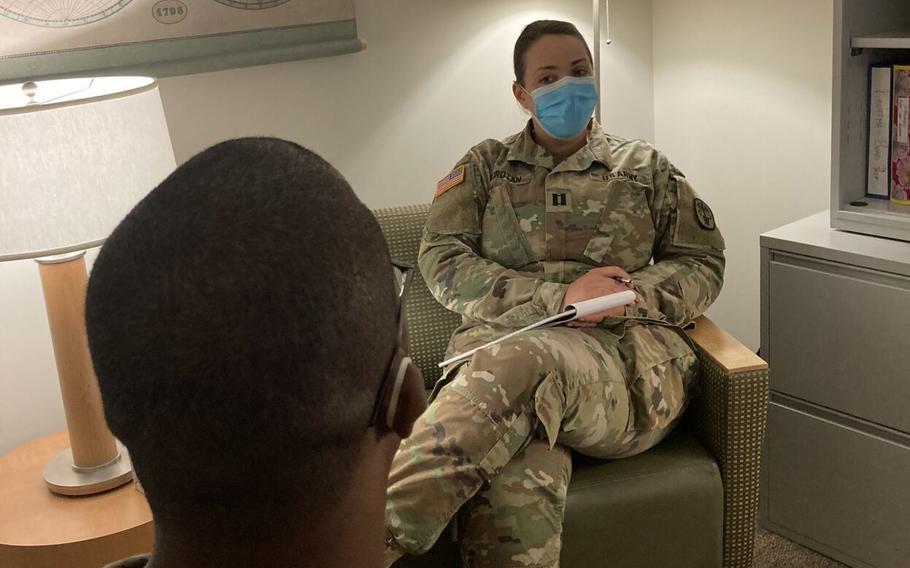
Capt. Ioana Horotan, staff psychiatrist at Blanchfield Army Community Hospital at Fort Campbell, Ky., speaks with a soldier about substance use disorder in April 2021. (Fort Campbell Public Affairs Office)
WASHINGTON — An Army veteran filed a lawsuit Thursday arguing his substance-use disorder in the military should be considered a mental health condition that would qualify him for an upgrade to his other-than-honorable discharge.
Mark Stevenson, 63, applied for a discharge upgrade in 2020, but the Army Board for Corrections of Military Records denied his claim. The lawsuit alleges the board didn’t adhere to a 2017 policy that requires it to give “liberal consideration” to veterans looking to upgrade their other-than-honorable discharges, also known as “bad paper,” in situations in which a service-related medical disorder could have led to their misconduct.
The policy has been applied to cases in which veterans were struggling with post-traumatic stress disorder, traumatic brain injury or military sexual trauma when they separated from the military. If successful, the lawsuit filed Thursday could make it easier for other veterans with substance-use disorders to secure upgrades, too.
“Substance-use disorders are mental health conditions,” said Dena Shata, a law student with Yale Law School’s Veterans Legal Services Clinic, which is representing Stevenson in the case. “The Army’s choice to declare otherwise goes against the plain language of binding guidance. This decision harms veterans with addictions and ‘bad paper,’ an already doubly stigmatized group.”
Stevenson enlisted in 1977 at the age of 19 and deployed to a base in the western portion of Germany. His unit was tasked with missile defense near the border with eastern Germany, which was occupied by the Soviet Union at the time.
According to the lawsuit, Stevenson arrived at the base during a period of increased anti-American sentiment in the region and a heightened risk of terrorist attacks against U.S. targets by far-left groups. Stevenson, who is Black, also experienced pervasive discrimination and harassment from fellow soldiers and German locals, the lawsuit states.
These factors led Stevenson to develop anxiety, which he treated with whiskey, hashish and eventually heroin. Stevenson went AWOL on three occasions and was kicked out of the military with an other-than-honorable discharge.
“I made serious mistakes,” Stevenson said in a statement. “I was young, terrified and had easy access to more alcohol and drugs than I knew what to do with.”
After the military, Stevenson struggled for decades with addiction and homelessness. Because of his other-than-honorable discharge, he had “no recourse within the veterans’ system” at the time, the lawsuit states. Other-than-honorable discharges disqualify veterans from receiving certain health and education benefits, as well as preferential hiring and tax breaks.
In 2002, Stevenson checked himself into a rehabilitation center in Bridgeport, Conn. He was treated for his substance-use disorder and has been sober for nearly 20 years. He remarried, earned a degree and became a certified substance-use counselor to help other veterans.
“I have taken accountability for my actions,” Stevenson said. “I’ve repaired relationships in my life and become a mentor to fellow veterans and others struggling with addiction. A second chance would mean everything to me.”
Stevenson applied for a discharge upgrade in 2020 and was denied in December 2021. The lawsuit alleges the decision by the Army Board for Corrections of Military Records was “inconsistent with legal, medical, scientific and even military understandings of mental health conditions.”
The lawsuit was filed in the U.S. District Court in Connecticut. The court has recently heard other cases brought by the Veterans Legal Services Clinic regarding discharge upgrades.
In February, the court ordered the Navy to review and potentially upgrade thousands of general and other-than-honorable discharges dating to 2012. In a lawsuit settlement, the Navy Discharge Review Board agreed to reconsider thousands of cases in which upgrades were denied despite evidence of veterans struggling with medical conditions at the time they were discharged.
The court approved a similar settlement in a class-action lawsuit against the Army last spring.